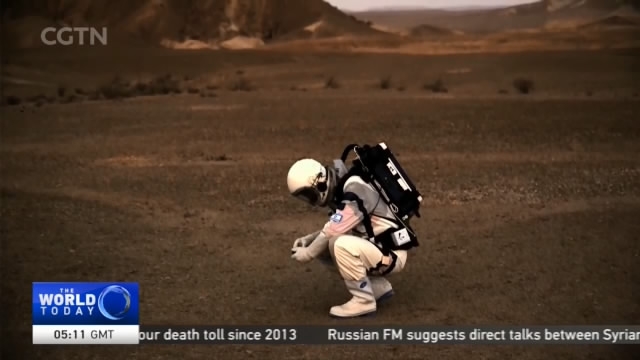
13:58, 21-Feb-2018
Mars in the Desert: Israeli astronauts conduct 4-day Mars simulation

In keeping with space exploration giants like China, Russia, and the United States, Israel is trying to grab a piece of "space" action. Which is why the country has just sent "astronauts" on a first-of-its-kind Mars simulation mission in the desert. CGTN's Stephanie Freid was at the site when the astronauts emerged after four days.
If this looks like a space age travel chapter, that's the idea. These Israeli explorers spent four days in this pod simulating a Mars mission. They wore space suits to explore outside the 50 by 50 meter pod, utilized solar panels for energy, gathered soil samples and even tweaked communications systems to reflect the 20 minute lag time it takes for an email message to go from Mars to Earth.
STEPHANIE FREID THE NEGEV DESERT "This was the location of choice for the experiment because the scientists here say it most closely matches Mars when it comes to topography, climate and isolation. It doesn't reach minus sixty degrees Celsius in Israel's desert as it does on Mars, but that didn't present a problem."
Some problems that DID present: the space suits were too hot, the electricity quit and communications delays slowed down urgent problem-solving issues. The diverse team made up of a micro-biologist, satellite inventor, nuclear physicist, astronomy guide, architect & social worker say the challenges will take them to the next level.
JACQUELINE FAY "ASTRONAUT", THE NEGEV DESERT "Everything that happened was a ginor- a huge first step. Everything that we learned in the last four days we're now going to take forward and document what worked, what didn't work, how can we improve it."
The project goals are to build a spaceship, study the influence of cosmic radiation on humans and design a habitat adapted to the quote un-quote "Red Planet".
Ultimate personal goals?
JACQUELINE FAY "ASTRONAUT", THE NEGEV DESERT "We're going to Mars."
That may take awhile. Phase two of the project is scheduled for 2019. Stephanie Freid, CGTN, The Negev Desert, Israel.

SITEMAP
Copyright © 2018 CGTN. Beijing ICP prepared NO.16065310-3
Copyright © 2018 CGTN. Beijing ICP prepared NO.16065310-3